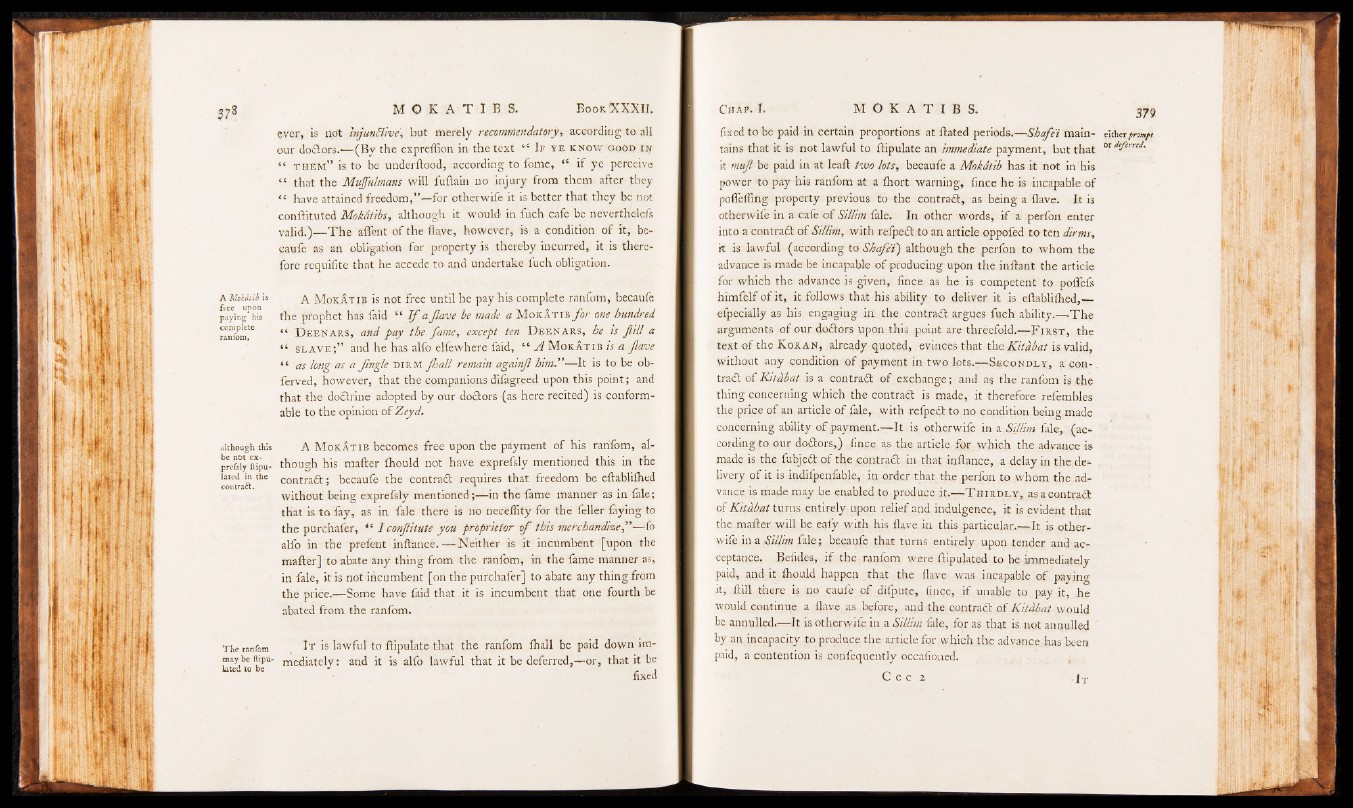
A M o ka tib is
free upon
paying his
complete
ranfom,
although this
be nt>t ex-
prefsly flipu-
lated in the
contract.
The ranfom
may be ftipu-
lated to be
ever, is not ityunBiw, but merely recommendatory, according to all
our doctors.— (By the expreflion in the text “ If y e k n o w g o o d in
“ t h e m ” is to be utiderftood, according to fome, “ i f ye perceive
“ that the Mujfulmans will fuftain no injury from them after they
P have attained freedom,” —for otherwife it is better that they be not
•conftituted Mokdtibs, although it would in fuch cafe be neverthelefs
valid.)— T h e affent of the Have, however, is a condition of it, becaufe
as an obligation for property is thereby incurred, it is therefore
requifite that he accede to and undertake fuch obligation.
A M o k a t i b is not Free until he pay his complete ranfom, beqaufe
thé prophet has faid “ I f a Jlave be made a M o k a t i b fo r one hundred
“ D e e n a r s , and pay the fame, except ten D e e n a r s , he is f ill a
“ s l a v e ; ” and he has alfo elfewhere faid, “ A M o k A t i b is a fa v e
“ as long as a fn g le d i r m Jhall remain againfl him."— It is to be ob-
ferved, however, that the companions difagreed upon this point; and
that the doctrine adopted by our doctors (as here recited) is conformable
to the opinion of Zeyd.
A M o k a t i b becomes free upon the payment o f his ranfom, although
his matter fhould not have exprefsly mentioned this in the
contradt; becaufe the contradt requires that freedom be eftablifhed
without being exprefsly mentioned;— in the fame manner as in fale;
that is to fay, as in fale there is no neceffity for the feller faying to
the purchafer, “ I confitute you proprietor o f this merchandize,"— fo
alfo in the prefent inftance.— Neither is it incumbent [upon the
matter] to abate any thing from the ranfom, in the fame manner as,
in fale, it is not incumbent [on the purchafer] to abate any thing from
the price.— Some have faid that it is incumbent that one fourth be
abated from the ranfom.
It is lawful to ftipulate that the ranfom (hall be paid down immediately
: and it is alfo lawful that it be deferred,— or, that it be
fixed
fixed to be paid in certain proportions at ttated periods.— Shafei maintains
that it is not lawful to ttipulate an immediate payment, but that
it tnufi be paid in at leaft two lots, becaufe a Mokatib has it not in his
power to pay his ranfom at a fhort warning, fince he is incapable of
poffeffing property previous to the contradt, as being a Have. It is
otherwife in a cafe o f Sillim fale. In other words, if a perfon enter
into a contradt of Sillim, with refpect to an article oppofed to ten dir ms,
it is lawful (according to Shafe'i) although the perfon to whom the
advance is made be incapable of producing upon the inftant the article
for which the advance is given, fince as he is competent to poflefs
himfelf of it, it follows that his ability to deliver it is eftablifhed,_
efpecially as his engaging in the contradt argues fuch ability.— -The
arguments o f our dodtors upon this point are threefold.— F i r s t , the
text of the K o r a n , already quoted, evinces that the Kitdbat is valid,
without any condition of payment in two lots.— S e c o n d l y , a eon-,
trad! of Kitdbat is a contradt of exchange; and as the ranfom is the
thing concerning which the contradt is made, it therefore refembles
the price of an article of fale, with refpedt to no condition being made
concerning ability of payment.— It is otherwife in a Sillim fale, (according
to our dodtors,) fince as the article fpr which the advance is
made is the fubjedt of the contradt in that inftance, a delay in the de-
livery of it is indifpenfable, in order that the perfon to whom the advance
is made may be enabled to produce it.— T h i r d l y , as a contract
of Kitdbat turns entirely upon relief and indulgence, it is evident that
the matter will be eafy with his Have, in this particular.— It is other-
wife in a Sillim fale; becaufe that turns entirely upon tender and,acceptance.
Befides, if the ranfom were ftipulated to be immediately
paid, and. it fhould happen that the Have was incapable of paying
it, .ftill there is no caufe of difpute, fince, if unable to pay it, he
would continue a Have as before, arid the contradt of Kitdbat would
be annulled.— It is otherwife in a Sillim fale, for as that is not annulled
by an incapacity to produce the article for which the advance,.has been
paid, a contention is confequently occafioned.
C c c z
either prompt
or deferred.
I t